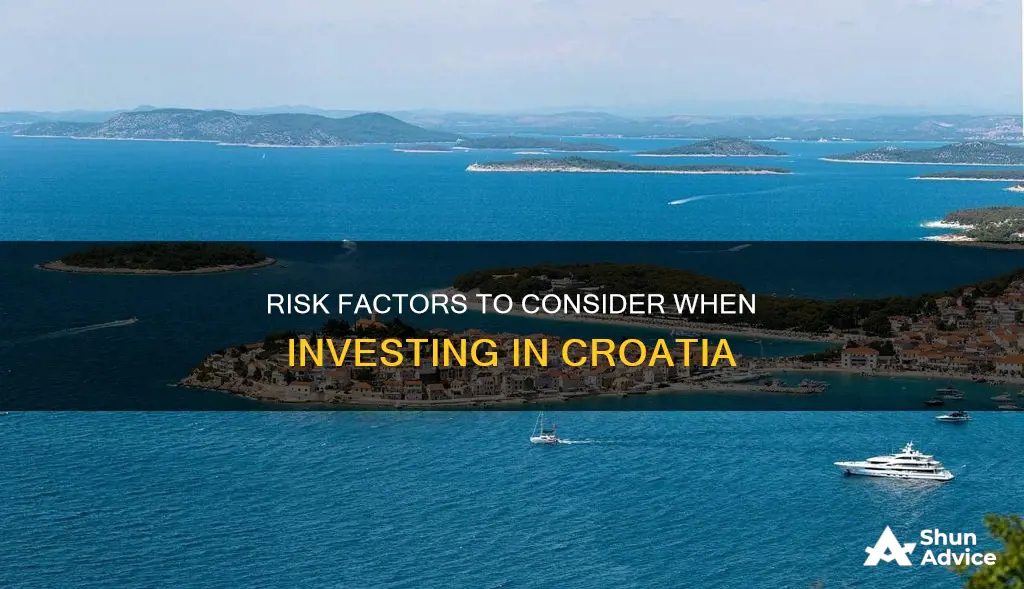
Croatia's economy is heavily dependent on tourism, which contributes to approximately 20% of its GDP. The country's strategic location in Europe and booming tourism industry make it an attractive prospect for investors. However, there are several risk factors to consider before investing in Croatia. Firstly, bureaucratic red tape and a lack of transparency within the government can create hurdles for investors. The country's economy is also vulnerable to fluctuations, and investors need to be cautious about economic instability, currency fluctuations, and market volatility. Additionally, language barriers can pose a challenge, especially when dealing with government officials, lawyers, or real estate agents. Furthermore, corruption is a concern, with Croatia ranking 57th out of 180 countries in the Corruption Perceptions Index.
| Characteristics | Values |
|---|---|
| Bureaucracy | High |
| Corruption | Ranked 57 out of 180 countries in the 2022 Corruption Perceptions Index |
| Dispute resolution | Inefficient |
| Economic instability | Currency fluctuations, political instability, and market volatility |
| Language barriers | English is widely spoken, but not by all |
| Regulatory changes | Lack of transparency |
What You'll Learn

Bureaucracy, corruption, and dispute resolution
Croatia's bureaucratic and regulatory processes can be complex and time-consuming, impacting both citizens and companies. The country has a large government bureaucracy, which, along with underperforming state-owned enterprises and low regulatory transparency, poses challenges to investors. However, digitalization efforts accelerated by the COVID-19 pandemic have helped reduce excessive bureaucratic procedures.
Croatia's legal system is civil and provides for the enforcement of legal contracts and the ownership of property. The country's constitution guarantees the free transfer, conversion, and repatriation of profits and invested capital for foreign investments. While the legal framework is based on a continental European model, there are unique titling issues, separate ownership of buildings and land, and inconsistent regulations regarding coastal property ownership and construction.
The judiciary is often mentioned as one of the greatest barriers to investment in Croatia. The system is characterized by judicial inefficiencies, lengthy administrative procedures, and delays in obtaining judgments. These factors make dispute resolution through the courts an unattractive option for companies, who often seek alternative means to resolve disputes without judicial remedies.
Croatia's challenges with the legal system and a lack of transparency in both the private and public sectors have been significant difficulties for investors. Transparency in developing legislation and regulations is often hampered by inefficient public administration and a lack of coordination between government entities. The significant backlog of cases in the court system further exacerbates these issues.
Corruption is another concern in Croatia, with the country ranking 57 out of 180 countries in the Corruption Perceptions Index 2022 by Transparency International. The business community has identified corruption in the healthcare and construction sectors, as well as a lack of transparency in the public procurement process, as obstacles to foreign investment.
To combat corruption, Croatia has a suitable legal framework that includes laws and penalties. The Criminal Code and the Criminal Procedure Act provide tools and sanctions to investigate and prosecute corruption cases, including asset seizure and forfeiture. Additionally, the country has anti-corruption legislation such as the State Attorney's Office Act, the Public Procurement Act, the Conflict of Interest Prevention Act, and the Money Laundering Prevention Act.
Croatia's accession to the European Union in 2013 and subsequent economic reforms have helped improve the business environment and reduce some of the bureaucratic obstacles. The country's stable political environment, educated workforce, and strategic location continue to make it an attractive destination for foreign investment.
Art Investments: Financial Sensibility or Senseless Spending?
You may want to see also

High debt ratios
Croatia's public debt remains elevated, despite fiscal consolidation efforts since 2015. The country's public debt-to-GDP ratio has been decreasing gradually and is projected to reach 60% of GDP by 2025. However, it is important to note that public debt was as high as 87% of GDP in 2020 due to large stimulus measures during the Covid-19 crisis.
Croatia's external debt-to-GDP ratio is also considered unfavourable. The country's gross external debt is expected to remain elevated at close to 90% of GDP. However, the annual external debt-service ratio has improved, declining from 35% in 2020-2021 to around 20% in 2023-2024. Additionally, Croatia's accession to the Eurozone in 2023 has provided access to the pooled FX reserves of the European Central Bank, reducing external vulnerabilities related to exchange-rate risk.
While the country's debt ratios remain a concern, it is important to acknowledge the efforts made by the Croatian government to improve its fiscal position. The annual fiscal deficit has narrowed significantly, and the government continues to work towards reducing the public debt-to-GDP ratio. The backing of the European Central Bank is also expected to strengthen Croatia's economy and increase its resilience to external economic shocks.
FD Investments in India: Worthwhile or Not?
You may want to see also

Lack of economic diversification
Croatia's economy is heavily reliant on tourism, which contributes to approximately 20% of its GDP. While the country has made efforts to diversify its economy, the service sector, particularly tourism, remains dominant. This lack of economic diversification can be a risk factor for investors, as it makes the country's economy vulnerable to external shocks and fluctuations in the tourism industry.
The tourism industry in Croatia has experienced a boom in recent years, with an exponential increase in tourist arrivals. This has had a positive impact on the property market, driving up demand and property prices in popular tourist destinations such as Dubrovnik, Split, and Hvar. Even inland cities like Zagreb are experiencing a tourism-induced property value hike.
However, the concentration of economic activity in the tourism sector can be a double-edged sword. While it has contributed to the country's economic growth, it also makes the economy vulnerable to any factors that may negatively affect tourism. For example, the COVID-19 pandemic significantly impacted the tourism industry worldwide, and Croatia was no exception. The country's economy contracted by 8.7% in 2020 due to the pandemic, highlighting the risks associated with a lack of economic diversification.
Additionally, being heavily reliant on tourism can make Croatia's economy more susceptible to factors such as political instability, unfavourable weather conditions, or global economic downturns, which can all impact travel and tourism.
To mitigate this risk, the Croatian government has been taking steps to attract foreign investment and promote economic diversification. The country's EU membership has provided new opportunities for trade and investment, and the government has settled long-standing investment disputes. Additionally, the government has implemented measures to improve the business climate, such as reducing bureaucratic procedures and promoting digitalisation.
In conclusion, while Croatia's tourism-driven economy offers attractive investment opportunities, particularly in the property market, investors should be aware of the risks associated with a lack of economic diversification. Diversifying the economy and reducing reliance on the tourism sector could help mitigate these risks and make Croatia a more resilient and attractive investment destination.
Accessing Your ENT Investment Portfolio: A Step-by-Step Guide
You may want to see also

Labour shortages
The Croatian labour market is characterised by labour shortages in specific occupations, which is partly due to the emigration of Croatians to other EU member states. In 2022, the working-age population (aged 15 and over) was estimated to be 3,508,000, out of which only 1,710,000 were employed. The unemployment rate for that year's third quarter was 6.7%.
The greatest labour shortages in Croatia are recorded in occupations such as:
- Construction workers (masons, carpenters, steel benders, etc.)
- Vehicle-related occupations (truck drivers, mechanics, painters, etc.)
- Chefs and bakers
- Software developers and designers
The tourism industry, a major source of revenue for Croatia, has been facing a shortage of workers, with an estimated deficit of 10,000 workers in 2022. This issue has been exacerbated by the post-pandemic return of tourists and the Great Resignation phenomenon, where employees have re-evaluated their jobs during the pandemic. To address this, Croatia has been recruiting workers from neighbouring Balkan countries and as far as Asia.
The country's transition to the euro in 2023 and its stable banking sector may help mitigate financing risks and attract foreign investment. However, issues such as bureaucracy, corruption, and dispute resolution continue to pose challenges for businesses.
Foxconn's India Investment: Where and Why?
You may want to see also

Inefficient administration
Regulatory Framework and Transparency
While Croatia's regulatory framework is generally business-friendly, weaknesses in transparency and intra-governmental coordination have been noted. The process of developing legislation and regulations is often hampered by inefficient public administration, resulting in a lack of clarity for businesses. This lack of transparency and unpredictable regulatory framework have been identified as barriers to investment.
Judicial System
The judiciary is often mentioned as one of the greatest barriers to investment in Croatia. The system is characterised by judicial inefficiencies, delays, and political influence. The significant backlog of cases has made dispute resolution through the courts unattractive for companies, who often seek alternative means of resolving disputes without judicial remedies. The World Bank loan aims to address these issues and improve the efficiency of the judicial system.
Property Transactions
The property transaction process in Croatia can be cumbersome and lengthy, particularly for foreign investors who are unfamiliar with the legal system. Multiple steps, a plethora of documents, and a lack of transparency can make investing in Croatian property challenging. Non-EU citizens, for example, need approval from the Ministry of Justice, which can be a time-consuming process. Additionally, the principle of reciprocity dictates that an investor's home country must allow Croatian citizens to own property there for them to be eligible to buy property in Croatia.
Business Registration
Croatia has made some improvements in this area, offering online business registration through two e-government platforms. However, the overall business facilitation mechanism still needs enhancement to remove burdensome regulations and processes.
Dispute Resolution
The inefficient administration and judicial backlog in Croatia have made dispute resolution challenging. Companies often try to resolve disputes without seeking judicial remedies due to the long timeframes involved in obtaining court judgments. This can create uncertainty and increase the risk for investors.
Was Investment Manager tun: Strategien für finanzielle Erfolge
You may want to see also
Frequently asked questions
The economy is showing signs of improvement, with a 2.8% increase in 2023, making it one of the strongest in the EU. However, it is heavily dependent on tourism, which contributes to around 20%-25% of its GDP.
Key risks and challenges include bureaucracy, corruption, and dispute resolution. The country also has a history of issues with judicial inefficiency and a lack of regulatory transparency.
Croatia's full integration into the EU and adoption of the euro have enhanced its economic stability and provided new trade opportunities. Membership in the Eurozone has also reduced external vulnerabilities related to exchange-rate risk.
Historically, the most promising sectors have been tourism, telecommunications, and pharmaceuticals. However, there are growing investment opportunities in the IT and clean energy sectors, with the government investing in renewable energy sources and digital innovation.
Croatia has established laws to combat corruption, such as asset seizure and penalties for corrupt practices, which apply to both domestic and foreign investors. However, corruption and a lack of transparency remain issues, particularly in sectors like healthcare and construction, hindering foreign investment.







